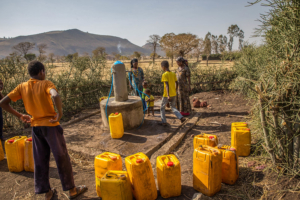Initiatives Ensuring Access to Clean Water in Ethiopia
 Ethiopia faces a significant water crisis, with roughly 60 million of its 126 million citizens lacking access to safe drinking water. This issue is compounded by surface water pollution, resulting from the country’s rapid population growth, urbanization and inadequate waste management. However, several nongovernmental organizations (NGOs) and government agencies have implemented initiatives to ensure access to clean water in Ethiopia.
Ethiopia faces a significant water crisis, with roughly 60 million of its 126 million citizens lacking access to safe drinking water. This issue is compounded by surface water pollution, resulting from the country’s rapid population growth, urbanization and inadequate waste management. However, several nongovernmental organizations (NGOs) and government agencies have implemented initiatives to ensure access to clean water in Ethiopia.
WaterAid’s Deliver Life Project
WaterAid works from a bottom-up approach to alleviate water contamination in Ethiopia through the “Deliver Life” project. WaterAid has shared this project with 128,259 people from 177 communities to help relieve water contamination and related illnesses. This initiative focuses on tackling dirty water, creating sanitary toilets and teaching good hygiene practices.
WaterAid’s project successfully provided 10 Ethiopian schools access and resources to address water contamination. This was achieved through the distribution of water points, water supply systems, gender-separated toilets and teachings on hygiene and menstrual hygiene. WaterAid also taught eight small businesses how to manage liquid and solid waste. Furthermore, they provided waste vehicles to help reduce the likelihood of water contamination from poor sanitation.
UNICEF and ONEWASH
The United Nations Children’s Fund (UNICEF) works with the Ethiopian government on the ONEWASH National Programme, a widespread national appeal to follow water, sanitation and hygiene (WASH). This collaboration targets water contamination by producing specific fecal and chemical contamination standards, sharing resources on hygiene practices and building water systems that prioritize cleanliness.
UNICEF and ONEWASH help prevent water contamination by improving hygiene standards and water cleanliness, reducing water-related disease and infection.
Water4Ethiopia
Water4Ethiopia fundraises to supply clean water sites in Ethiopia. Following funding, volunteers work with nonprofit organizations to find a clean-water site. The nonprofit organizations oversee the building and construction of springs or wells and ensure that local people are involved in the process from start to finish.
The wells and springs ensure that the local community has continuous access to clean water despite infectious diseases in the area. Water4Ethiopia has benefited more than 5,000 people to date.
City-Wide Inclusive Sanitation
The City-Wide Inclusive Sanitation (CWIS) project in Ethiopia strives to address water contamination and improve sanitation in four towns in Ethiopia: Sheno, Welenchiti, Maksegnit and Kebridehar. This approach ensures that all locals, even those from low-income backgrounds within these towns, can get clean water.
This is achieved through initiatives that tailor solutions to specific areas, such as analyzing which technologies will improve certain areas. For example, in smaller, rural settlements, CWIS implements on-site sanitation, whereas in cities, CWIS provides sewers. This program ensures that clean water is accessible for everyone, regardless of background, helping to reduce water contamination by improving access to a clean, fresh supply.
Rainwater Harvesting
The Ethiopian Ministry of Water and Energy has developed a method for collecting clean water using rainwater. Ethiopia’s lack of sanitary water sources means many people turn to ponds or rivers. These sources are often contaminated and cause illness. The rainwater harvesting approach is active nationally, reaching nearly 70% of the population.
It utilizes roof water, which is generally of decent to good quality, making it potable and much less likely to cause disease or illness than water from rift valleys. Approximately 4 million people now have access to clean water through rainwater harvesting. This brings the total number of Ethiopians with access to clean drinking water to just less than 75 million.
Conclusion
Ethiopia’s ongoing battle against water contamination is being addressed through various initiatives that improve access to clean water, sanitation, and hygiene education. Indeed, projects like WaterAid’s Deliver Life, UNICEF’s ONEWASH, and rainwater harvesting have benefited millions. Sustained efforts and collaboration will be essential in expanding these successes and ensuring safe water for all Ethiopians.
– Ella Dorman
Ella is based in Worcestershire, UK and focuses on Global Health for The Borgen Project.
Photo: Flickr
